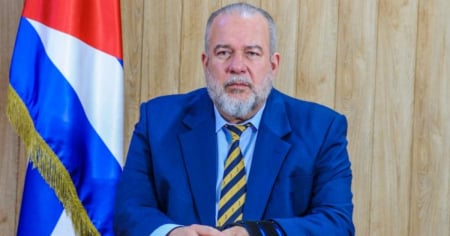The Minister of Economy and Planning, Joaquín Alonso Vázquez, urged families to have faith and work creatively to "build the Cuba we dream of," assuring that "it is possible and it will be possible" under the leadership of the Communist Party.
In his presentation before the National Assembly, Alonso Vázquez urged confidence in the future of the island just moments after projecting an economic growth of 1% in 2025, according to the official site Cubadebate.
The positive figure regarding the Gross Domestic Product was based on the recovery of tourism, the increase in key exports, and the revitalization of sectors such as agriculture and industry.
It was also emphasized that the stabilization of the electricity system and the improvement in fuel balance will be essential factors in achieving this objective.
However, the economic balance of 2024 revealed multiple challenges: low foreign currency revenues, failures in agricultural production, a decline in electricity generation, and paralyzed industrial sectors such as steel and cement.
Despite these difficulties, the minister emphasized that the country must find alternatives to reduce the fiscal deficit and increase external revenue, prioritizing service exports and tourism.
Alonso Vázquez emphasized that the key to development lies in ensuring energy availability and attracting greater foreign direct investment, as well as strengthening remittances and exports of innovative products. Regarding inflation, he projected a reduction by 2025, with figures expected to range between 25% and 30%.
The minister's message emphasizes the need to confront challenges with planning and confidence, amidst an economic landscape characterized by profound structural limitations.
Just a few hours ago, the Cuban government stated that inflation is showing a slight slowdown, reporting that by the end of October 2024, the rate stood at 28%. However, experts have challenged this claim, asserting that the island is actually experiencing "stagflation."
In early December, Alonso Vázquez expressed the same idea, asserting that inflation has decreased, although Cubans do not notice it in market prices.
Frequently Asked Questions about the Economic Situation and Growth in Cuba
Why does Cuba's Minister of Economy assert that "it is possible and it will be possible" to achieve economic growth?
The Minister of Economy, Joaquín Alonso Vázquez, asserts that economic growth is achievable due to the recovery of tourism, the increase in exports, and improvements in sectors such as agriculture and industry. He also highlights the stabilization of the energy system and the attraction of foreign investment as key factors in reaching a GDP growth of 1% by 2025.
What are the main economic challenges Cuba faces for 2025?
Cuba is facing significant challenges such as low foreign exchange income, failures in agricultural production, and a decline in electricity generation, along with paralyzed industrial sectors. Additionally, there is a persistent high fiscal deficit and inflation estimated between 25% and 30%. These structural problems constrain the country's capacity to achieve the anticipated economic growth.
What measures does the Cuban government propose to improve the economic situation?
The Cuban government aims to strengthen domestic production, improve the electric power system, and attract more foreign direct investment, focusing on the recovery of tourism and an increase in exports. However, experts remain skeptical about the viability of these measures, given the structural limitations and the lack of tangible results.
What impact does the energy crisis have on Cuba's economy?
The energy crisis is severely affecting both the economy and daily life in Cuba. The lack of fuel and deteriorating electrical infrastructure have led to prolonged blackouts, impacting industrial production and the quality of life for the population. These issues also restrict access to essential services and basic goods.
Filed under:
